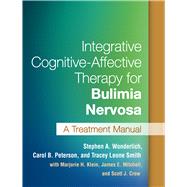Packed with useful clinical tools, this state-of-the-art manual presents an empirically supported treatment solidly grounded in current scientific knowledge. Integrative cognitive-affective therapy for bulimia nervosa (ICAT-BN) has a unique emphasis on emotion. Interventions focus on helping clients understand the links between emotional states and BN as they work to improve their eating behaviors, defuse the triggers of bulimic episodes, and build crucial emotion regulation skills. In a large-size format for easy photocopying, the book includes 47 reproducible handouts. Purchasers get access to a Web page where they can download and print the reproducible materials.








